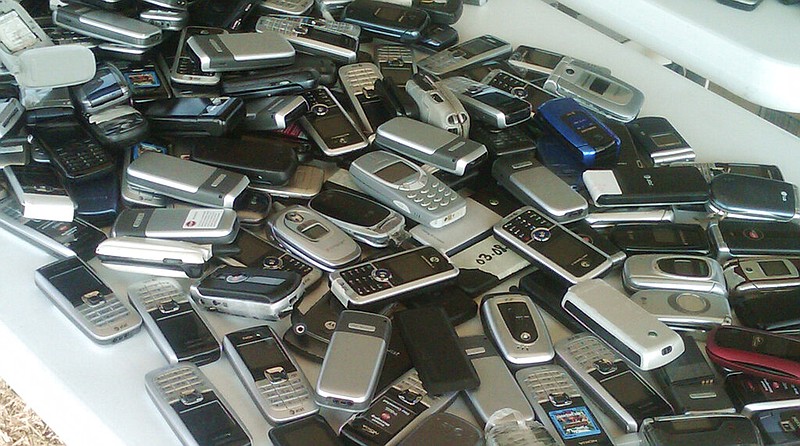The Arkansas Division of Corrections is examining cellphone jamming options to combat illicit cellphone activities within its prisons.
The Board of Corrections discussed multiple options during its meeting Friday at the McPherson Unit in Newport, including the potential use of jamming equipment at facilities.
Friday's meeting was the first in-person meeting held at a unit since the covid-19 pandemic began.
Board members discussed cellphone jamming technology at length, with some suggesting contacting the state's attorney general's office to see if a lawsuit could be filed against the federal government in an effort allow the equipment to be used in Arkansas prisons.
"People will think cellphones aren't a big deal and they should have them, but the problem is what if they call a victim using that phone?" Board of Corrections Chairman Benny Magness said. "What if the person is calling a rape victim? It's things like this you have to think about."
The topic arose after Magness noted that a report showed the amount of illegal cellphones seized from inmates had dropped by a large amount compared with previous years. The report said 862 cell phones were confiscated in fiscal year 2021 compared with 1,420 in fiscal year 2020 and 1,796 in fiscal year 2019.
Magness said he found that hard to believe because cellphone activity has been a consistent problem within the prison system.
Department of Corrections Secretary Solomon Graves said cellphone usage probably hasn't gone down, and that staff members who are stretched thin have less time to do aggressive searches for contraband.
Board member John Felts asked if it were possible for the prison system to use cellphone-jamming technology to help curb the problem.
Graves said state prisons can get secondary towers installed at facilities that target phones in the area and degrade the ability to make calls, but noted that the towers aren't foolproof.
"South Carolina used it, but found it didn't justify the price," he said.
Graves said the price is the reason he wants to implement a full jamming system that can turn phones into "bricks" in certain areas, but he said that concept faces opposition from cellular lobbyists who argue the jammer might bleed over and affect private citizens.
"The issue is that private citizens aren't in our facility," he said.
Cellphone jamming at federal and state prisons has been an issue for several years.
Currently, federal law prohibits the operation, marketing or sale of any type of jamming equipment that interferes with authorized radio communications, including cellphones.
Local law enforcement agencies do not have independent authority to use jamming equipment. In certain limited exceptions, use by federal law enforcement agencies is authorized in accordance with applicable statutes.
U.S. Sen. Tom Cotton, R-Arkansas, attempted to pass a bill in 2019 that would have changed the law to allow jammers at prison facilities, but it failed.
The Federal Communications Commission discussed last year the idea of allowing state prisons across the country more technological options to combat contraband cellphones, but broad cell signal jamming was not discussed.
U.S. Rep. Steve Womack, R-Arkansas, also mentioned on social media that he had discussed targeted cellphone jamming with Graves during an event in Washington, D.C.
Magness said another reason cellphones are problematic within prisons is the need to be able to track what is being said during phone calls.
"There are certain words that are flagged in calls that come to our attention that need to be monitored," he said.
Graves said he believed the FCC concerns are unwarranted and said companies such as Walmart use geolocation technology to track someone when they pick up groceries or to send advertisements to them while inside the store. That, he said, proves access to cellular phones can be pinpointed and accurate.
"Let us use the same technology as the big box stores," Graves said. "Let us map out our facility by the feet to ensure that if you are in that bubble then your phone won't work."
Dr. William "Dubs" Byers said he had heard some federal prisons have cellphone jamming technology.
"How do they have the ability to block phones but they won't give the states the same ability?" he said.
Magness suggested that officials consider meeting with the attorney general to see if filing a lawsuit could lead to the prison system being allowed to implement jamming equipment.
The Board of Corrections also approved using the Emergency Powers Act to expedite the release of 101 women prisoners on the act's 90-day list to address overcrowding, and using the Emergency Powers Act to expedite the release 114 total inmates (98 men and 16 women) to address overcrowding in county jails.

